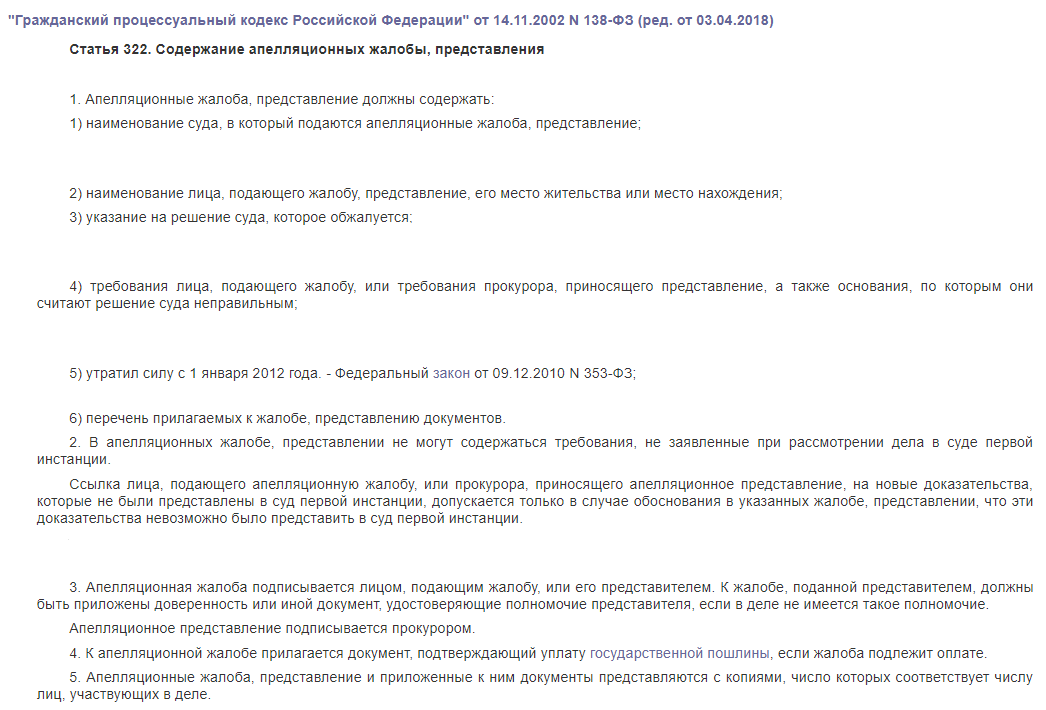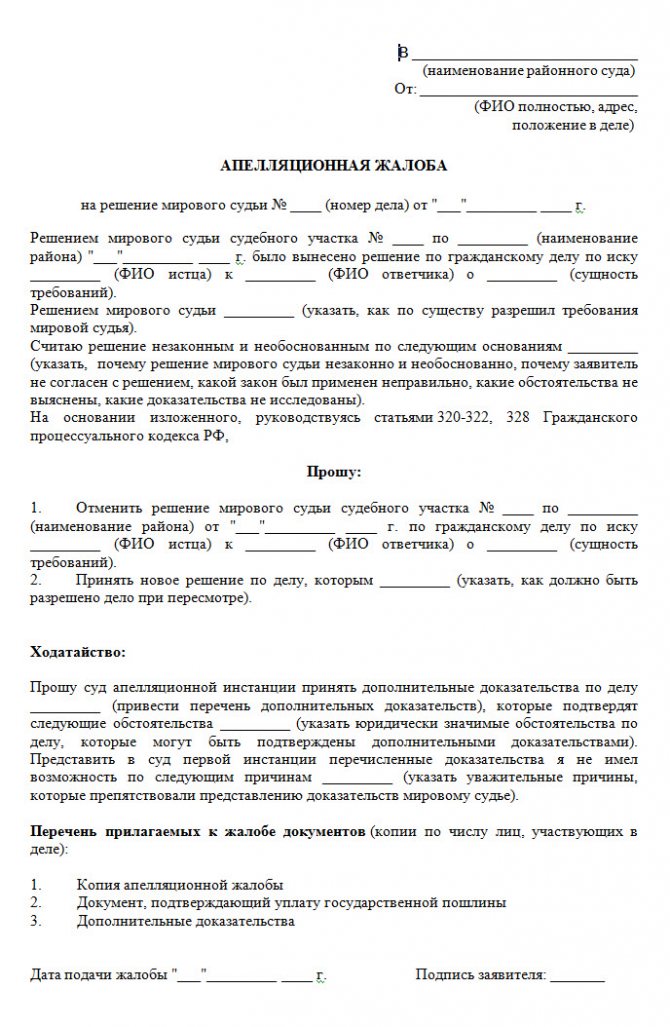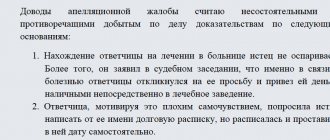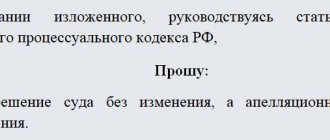Free legal advice online
Attention! Preventative work is being carried out on the site, and therefore, from 10/07/2020. until 10/31/2020 There may be malfunctions in its operation. If you were unable to immediately go to the document, information, sample document, statement of claim, sample complaint or petition required by request, you can find it either through the horizontal search menu (see highlighted in yellow at the top) by specifying its value in the search field , or find it in the left context menu (column) by selecting the appropriate section you need. When using the search horizontal menu, it is important to take into account the fact that when entering phrases that are not included in a particular document, you may not receive the required answer to your request. Therefore, when entering phrases into the search menu, use short search phrases (example: Donation Agreement, Protocol of Disagreements, Appeal, etc.). We apologize for the inconvenience caused to you.
If you need our help and you have not found the information you are interested in in the sections of the site or in the search field on our website, then you can call us free of charge
Appeal against the decision of the magistrate
B __________________________ (Name of district court, address)
In civil case No. ________
Plaintiff: _____________________ (full name, residential address, contact details)
Defendant: __________________ (full name, residential address, contact details)
Cost of claim: __________________ (Full amount of claims)
Appeal
on the decision of the magistrate
____________________ (indicate the full name of the justice of the peace, court district number) a decision was made in civil case No. ________ on the claim of ____________________ (full name of the plaintiff, address) against ___________________ (full name of the defendant, address ) about _______________________ (indicate the subject of the claim), according to which _______________________ (indicate the content of the operative part of the court decision). At the time of appeal to the appellate court, this decision had not entered into legal force.
The decision of the magistrate is based on the following grounds ___________________ (indicate the arguments on the basis of which the court decision was made).
At the same time, when considering the case, the magistrate __________________ (full name, court district no.) did not take into account (drew incorrect conclusions) the following circumstances (evidence) _________________________ (list the arguments (evidence) of the plaintiff (defendant) that were not accepted taken into account by the judge), as a result of which the decision of the magistrate ______________________ (full name, court district number) is unfounded.
In addition, the justice of the peace _________________________ (full name, court district number) committed the following violations during the consideration of the civil case ____________________________________ (indicate the violations committed, cite the legal norms that the decision of the justice of the peace does not comply with).
Taking into account the above, guided by the requirements of Articles 320 – 322 of the Civil Procedure Code of the Russian Federation,
ASK:
The decision of the magistrate ______________________ (full name, number of court district), made by "___" "________" 20 __ in civil case No. ________ on the claim of ___________________ (full name of the plaintiff, address) to ____________________ (F .I.O., defendant, address) about ____________________ (indicate the subject of the claim) to cancel and make a decision to satisfy the claims (to refuse to satisfy the claims - for the defendant).
Applications:
1. Copy of the appeal;
2. Receipt for payment of state duty;
3. Documents confirming the plaintiff’s arguments.
“___” “_________” 20__ Signature _________________
Legal consultation online (online) in the office and by phone
We provide legal assistance in pre-trial settlement of disputes, conduct claims work, negotiate to achieve results without trial, participate in civil, criminal and arbitration cases, at the stages of preliminary and judicial investigation.
A separate category of cases that we deal with is solving housing, financial and material problems of military personnel and members of their families. When you contact us for help, our company provides you with a personal specialist (lawyer or advocate) to resolve your issue. Throughout the process of resolving your issue, you will be provided with full information and legal support. Continue reading...
We are filing an appeal against the court's decision. The appeal itself has been written and filed.
The procedure for considering an appeal is defined in Article 327 of the Code of Civil Procedure of the Russian Federation
The court of first instance, before sending the case with an appeal to the appellate court, always invites the other party to submit its objections to the complaint. In this regard, of course, your wife can present her arguments in objections to the complaint
If your ex-wife finds out that you have moved to another job, she will, of course, reflect this in her objections.
Personally, I see the more reliable option of getting a new job and then filing a claim to reduce the amount of alimony on the basis of Article 1119 of the RF IC
“Civil Procedure Code of the Russian Federation” dated November 14, 2002 N 138-FZ (as amended on April 24, 2020)
Code of Civil Procedure of the Russian Federation Article 327. Procedure for consideration of the case by the court of appeal
(as amended by Federal Law dated December 9, 2010 N 353-FZ)
(see text in the previous edition)
1. The appellate court shall notify the persons participating in the case of the time and place of consideration of the complaint or appeal.
The appellate court reconsiders the case in a court hearing according to the rules of proceedings in the court of first instance, taking into account the features provided for in this chapter.
Persons participating in the case, their representatives, as well as witnesses, experts, specialists, translators are allowed to participate in the court hearing through the use of video conferencing systems in the manner established by Article 155.1 of this Code.
(paragraph introduced by Federal Law dated April 26, 2013 N 66-FZ)
The paragraph is no longer valid. — Federal Law of November 28, 2018 N 451-FZ.
(see text in the previous edition)
2. The court hearing of the appellate instance is opened by the presiding judge, who announces what case is being considered, on whose appeal, presentation it is subject to consideration and against the decision of which court this complaint, presentation was filed, finds out which of the persons participating in the case, their representatives appeared, establishes the identity of those who appeared, checks the powers of officials, their representatives and explains to the persons participating in the case their procedural rights and obligations.
The consideration of the case in the appellate court begins with a report from the judge, who sets out the circumstances of the case.
(as amended by Federal Law No. 451-FZ of November 28, 2018)
(see text in the previous edition)
3. After the report, the appellate court hears the explanations of the persons participating in the case and their representatives who appeared at the court hearing. The first to speak is the person who filed the appeal, or his representative or the prosecutor, if he has submitted an appeal. If both parties appeal a court decision, the plaintiff will act first.
After the explanations of the person who filed the appeal, or the prosecutor, if he brought an appeal, and other persons participating in the case, their representatives, the appellate court, if there are appropriate petitions, reads out the evidence available in the case, after which it proceeds to examine the new evidence accepted by the court.
4. Upon completion of clarification of the circumstances of the case and examination of the evidence, the appellate court provides the persons participating in the case with the opportunity to speak in the judicial debate in the same sequence in which they gave explanations.
5. During each court session of the court of appeal, as well as when performing certain procedural actions outside the court session, a protocol is kept according to the rules provided for by Chapter 21 of this Code.
6. The appellate court does not apply the rules on combining and separating several claims, on changing the subject or basis of the claim, on changing the amount of claims, on filing a counterclaim, on replacing an improper defendant, on involving third parties in the case.
Sample and design instructions
The text reflects the participants in the process, the essence of the complaint with justification and the corresponding request to the court. When writing, be sure to reflect the following sections in the document:
- The full name and address of the district court - it is in this instance that the decisions of the magistrate are appealed.
- Civil case number.
- Full name, registration address and contact details of each party - plaintiff and defendant.
- The claim price is in rubles.
- In the text itself, they first describe the situation, refer to the number, name and date of the civil case. Next, indicate the arguments on the basis of which the magistrate made the corresponding decision. Then you should describe your reasons - i.e. what exactly the plaintiff or defendant disagrees with and for what reason. This part of the appeal is the most important - therefore, if you lack relevant experience, it is preferable to contact a qualified lawyer.
- The petition part clearly states the requirements - to recognize the decision of the magistrate as invalid.
- Next, indicate the applications, i.e. a list of originals or copies of documents that are attached as evidence. These may be examination results, reports, witness statements, damage assessments, photo, video, audio materials, etc.
- At the end there is a date, signature, its explanation (applicant’s surname, initials).
When compiling, you can use this form as a basis.
It is also useful to focus on specific examples of appeals - you can use this example as a basis.
General requirements for the content of the document are also specified in the Civil Procedure Code. At the same time, it is important for the applicant to understand that the complaint cannot contain new requirements that differ from the original ones. Such claims can be filed in a separate proceeding, and within the framework of the current one, only the claims that initially arose can be considered.

How to compose
The basis for filing and filing an appeal will be the final decision of the magistrate. It is issued following the consideration of a civil case in favor of one of the parties, however, if the claim is partially satisfied, each participant in the process can file a complaint.
The grounds for challenging are chosen independently by each participant in the process; they will need to be indicated in the content of the complaint. Since the appeal is a procedural document, it must be submitted in writing. After completing and filing a complaint, it will be added to the case file and sent for consideration to a higher court.
Note! Until the court decision is announced, filing a complaint is impossible, even if the participants in the process are confident in the outcome of the case. Only the magistrate’s proclamation of his verdict is the basis for moving to the next stage of the trial.

Example of an appeal against a decision of a magistrate
The text of the complaint must include the following content:
- The name of the appellate authority to which the complaint is sent;
- Personal data and contact information of all participants in the process;
- An indication of the date and number of the decision made;
- Description of the operative part of the judicial act;
- The grounds for challenging and the arguments that the applicant considers important for reviewing the case;
- Reference to violation of substantive or procedural law;
- A request to the court of second instance to completely or partially cancel the decision;
- Date and signature of the complainant.
Important! The complaint must indicate specific violations of the law committed by the magistrate. If the applicant believes that procedural norms have been violated, he must provide a link to the article of the Code of Civil Procedure of the Russian Federation.
Participants in the process can file a complaint independently or with the help of a qualified lawyer. The second option is much preferable, since with each subsequent instance the chances of successfully completing the process decrease. If you decide to prepare a complaint yourself, a sample can be downloaded from our website.
The complaint is submitted in the number of copies corresponding to the number of participants in the process. In addition, the package of documents must contain one complaint for the appellate judicial authority.
What to ask
The operative part contains a clearly expressed request from the appellant to the appellate authority about the desired result of the consideration. The request is inextricably linked with the powers of the appellate authority to verify the legality of court decisions.
Thus, the appellate authority has the right to make one of the following decisions:
- cancel the decision of the magistrate and send the material for a new consideration;
- cancel the decision and terminate the proceedings;
- cancel the decision completely and make a new decision at first instance;
- cancel the decision in any part of it.
Accordingly, the appeal may contain a request that corresponds to the above powers of the authority.
Submission deadline
Challenging judicial acts of the magistrate's court is allowed only within the procedural time limits established by the Code of Civil Procedure of the Russian Federation. An appeal against the decision of the magistrate must be filed no later than one month from the delivery of the decision in final form.

It is no coincidence that the condition on the need to issue an act in final form is provided by the legislator, since the court has the right to complete the process by announcing only the operative part of the decision. In this case, filing a reasoned complaint may be difficult, since the parties will not have the court’s conclusions regarding the reasons for the decision.
Note! The decision in its final form must contain introductory, descriptive, motivational and operative parts. The preparation of a full-fledged decision can take up to five days, during which time the period for challenging does not begin to run.
Compliance with the specified procedural deadline will be the personal filing of a complaint with a judicial authority, or its delivery to a postal office. In the latter case, confirmation of sending the complaint will be a postal receipt.
If the deadline for challenging is missed for valid reasons, citizens have the right to file a petition for its restoration. As a rule, compelling reasons for reinstating the period will be medical certificates indicating the presence of a serious illness, or long-term departure for objective reasons.
Rules for drawing up an appeal and payment of court fees
It is important to draft the text of the appeal, a document in which every word is important, and every error can serve as a basis for refusal. It must include:
- the full and exact name of the court (district, city) to which the judicial district of the magistrate who made the controversial decision in the case belongs;
- comprehensive information about all interested legal entities and individuals taking part, starting from the parties to the process and ending with third parties and the prosecutor, if they are present in the process;
- information about which particular decision (or which particular part of this decision) is the subject of the complaint, including its details and a brief summary of the essence of the decision of the magistrate;
- arguments indicating (from your point of view) the illegality of the decision and the need for its revision;
- the essence of the demands that you present in the appeal, which do not go beyond those already stated in the court hearing;
- a list of attachments to the complaint that you send to inform the court of appeal;
- date and signature of the applicant or his authorized person.
When signing an appeal by an attorney, the attached documents must include a power of attorney for this person.
All documentation on the case is submitted with copies, the number of which is sufficient for distribution to all interested parties. Regardless of which party to the proceedings you are, and whether you paid a filing fee or not, you must pay when filing an appeal. If you are filing an appeal as an individual, the basic fee will be 150 rubles. If you are suing on behalf of a company, an amount of 3,000 rubles is payable. There are a number of exceptions to this rule.
Representatives of government agencies do not pay the fee. The prosecutor also brings representation without paying it. It is not paid when filing an appeal against a court decision on divorce, and the fee is not paid for claims up to 1 million rubles:
- disabled people (groups I and II only), organizations/associations of disabled people;
- pensioners (when filing a claim regarding pension provision);
- consumers (in the case of consumerism).
The court may, by its decision, exempt from paying the state fee in the event of a difficult financial situation of the applicant. If the decision is made in your favor, the state fee, as part of the court costs, may be recovered from the defendant.









